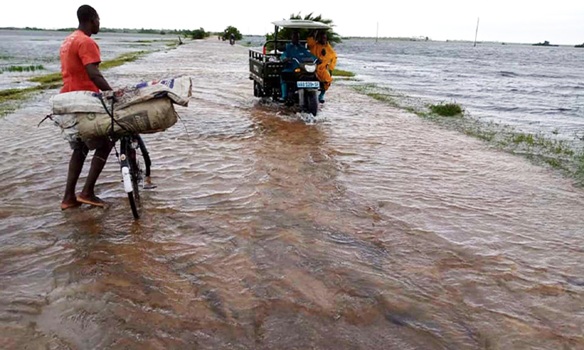Mozambique: France to finance doubling of Maputo-South Africa railway line - Watch
Floods forecast for 2026 affect Mozambique’s economic projections, central bank warns

FILE - For illustration purposes only. [File photo: O País]
The Bank of Mozambique has warned that potential floods expected in early 2026 could impact the country’s economy, particularly by disrupting food supplies, a key factor in its medium-term economic forecasts.
In its September Economic Situation and Inflation Outlook Report, the central bank identifies, among its “main internal assumptions,” the “maintenance of high pressure on the State Budget,” as well as the “gradual restoration of productive capacity and the supply of goods and services.”
It also states the “forecast of severe floods” in the first quarter of 2026, “which will affect the supply of goods, especially food.”
However, the report emphasises that in a context of “stability in the metical’s exchange rate against the US dollar,” projections indicate “that inflation will remain controlled, at single-digit levels in the medium term, despite the risks associated with fiscal tightening and supply shocks.”
“Regarding economic activity, excluding the natural gas sector, moderate growth is anticipated, supported by the gradual advancement of projects in strategic sectors of the national economy,” the document also states, noting that “the risks and uncertainties associated with inflation projections remain high.”
“The impacts of the worsening fiscal situation, amid growing challenges in mobilising financial resources for the State Budget, as well as climate shocks and the slow pace of restoring productive capacity and the supply of goods and services, stand out as likely factors for increasing inflation in the medium term,” it concluded.
On 12 September, Mozambican authorities warned of “high-magnitude” floods in the country and flooding of at least four million hectares of agricultural land during the rainy season, which began in October.
“In this second period [of the rainy season], which is January, February and March, we believe we will have rains, we will have high-magnitude floods, which we classify as a high level, especially in the Incomati, Maputo and Limpopo basins,” said Agostinho Vilankulos, National Director of Water Resources Management, on the sidelines of the National Climate Forecast Forum for the 2025/2026 rainy season, in Maputo.
According to the official, dams in Mozambique’s neighbouring countries, including South Africa and Eswatini, are at 99% of their storage capacity and, therefore, have little storage capacity, a situation that will force runoff and consequent flooding in the country.
“If the dams are full, then they have no storage capacity, so any rain that falls in neighbouring countries turns into runoff and comes to our country,” warned Vilankulos, highlighting the municipalities of Matola, Maputo, Beira and Quelimane as having a “high risk of flooding.”
He added that the agricultural sector is also expected to be affected by the rains, with at least four million hectares at risk.
At the same event, Isaías Raiva, a climatologist at the National Institute of Meteorology, stated that rains will be recorded throughout the country between January and March, with a significant impact on southern Mozambique, in addition to “some dry periods.”
Américo José, from the Mozambican National Institute of Health, predicts a higher incidence of malaria and diarrhoea in the provinces of Nampula in the north, and Zambézia and Tete in the centre of the country during the rainy season, considering that climate change poses a “direct and indirect threat to the health sector.”
National Director of Agriculture Hiten Jantilal in turn announced preventive measures for the approaching rains, including recommendations to farmers on “when to start sowing and how to minimise the risk of pests and diseases.”













Leave a Reply
Be the First to Comment!
You must be logged in to post a comment.
You must be logged in to post a comment.